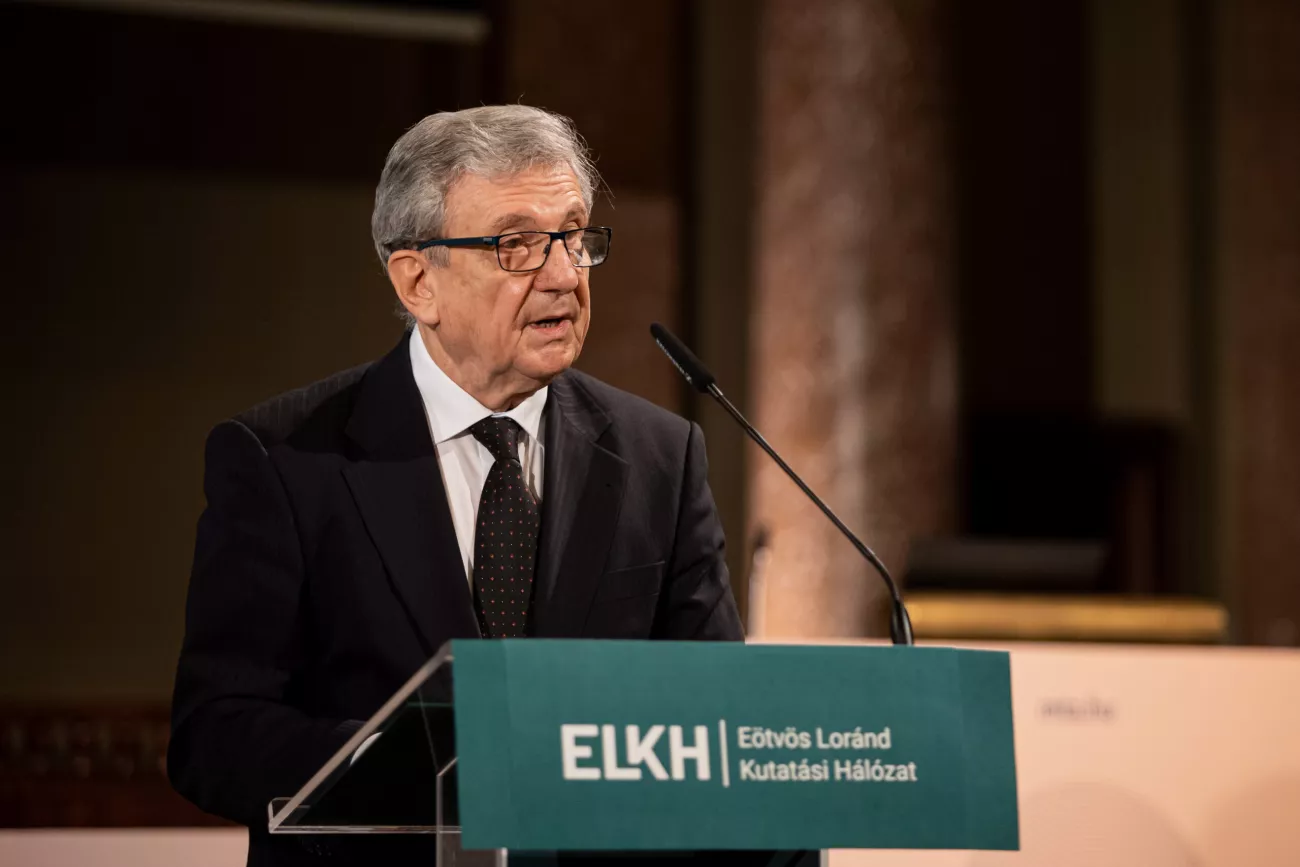The Eötvös Loránd Research Network (ELKH) Secretariat has established the Eötvös Loránd Research Network Prize and the Róbert Bárány Prize applicable to young researchers to recognize outstanding academic performance within the network. In addition, it has also launched the distribution of the title of Research Professor Emeritus. The 2021 ELKH Award Ceremony was held at the Hungarian Academy of Sciences on November 9 as part of the “Celebration of the Hungarian Science“ program of the Hungarian Academy of Sciences.
“It is important to identify the areas in which we have the capabilities, skills and resources to achieve outstanding results at an international level, while also contributing to the development of Hungarian science and the country. Dedicated, talented researchers play a vital role in helping us achieving our goals. We need to provide adequate research conditions, moral and financial recognition to retain them, and also to encourage those living abroad to return home. The establishment and distribution of the awards and titles presented today also serve this purpose,” emphasized Professor Miklós Maróth, President of ELKH.
Professor Tamás Freund, President of the Hungarian Academy of Sciences and József Bódis, Secretary of State for Higher Education, Innovation and Vocational Training have also addressed the audience at the Award Ceremony.
After the Award Ceremony Professor José R. Calvo, Strategic Advisor at the Barcelona Supercomputing Center, President of the Institute of International Relations of the Royal European Academy of Doctors, and Professor Pál Fodor, turkologist, historian, Doctor of the Hungarian Academy of Sciences, winner of the 2021 ELKH Prize, gave presentations.
Eötvös Loránd Research Network Prize
The purpose of establishing and presenting the Eötvös Loránd Research Network Prize (ELKH Prize) is primarily to offer moral and financial recognition to researchers belonging to the network for their outstanding professional work. The award is presented annually to a researcher who enjoys widespread appreciation in the scientific community at home and abroad, has an exceptional professional career, has achieved outstanding scientific performance, notable research results or patents.
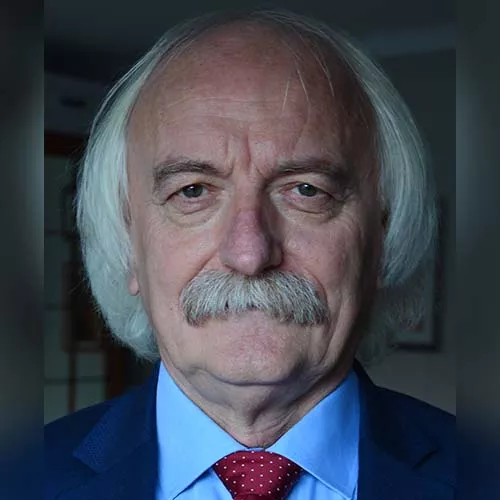
In 2021 the ELKH Prize was awarded to Professor Pál Fodor, turkologist, historian, Doctor of the Hungarian Academy of Sciences. Pál Fodor was the Director General of the ELKH Research Centre for the Humanities (BTK) from 2012 to 2021 and is currently the honorary Director General of BTK. He is also Scientific Advisor at the Institute of History of BTK and Head of the Institute's Medieval Department. He has been an active participant and shaper of both Hungarian and international scientific life for more than four decades.
His publications on many topics are also diverse in genre, ranging from large monographs to analytical studies, large-scale essays and extensive source publications. The approximately 20 volumes edited by him, mostly published by international publishers, have been invaluable to the presence and recognition of Hungarian historical science on an international level. He has been the leader of several research projects, the most important of which are the projects related to the siege of Szigetvár and the grave of Sultan Suleiman, as well as the battle of Mohács and its aftermath. The publications released in connection with these topics are among the most significant results of research into early modern Hungarian history.
His research, which has also received international recognition, has reinvigorated the study of the history of the Ottoman Empire in several ways. His most-acclaimed work in the academic world is an English-language monograph exploring the 17th-century changes in the administration and financial administration of the Ottoman Empire and the background to these changes. The work is undoubtedly one of the most significant individual achievements in international Ottoman research in recent decades.
With his modest but always determined and purposeful approach, Pál Fodor personifies the model image of Hungarian science, in which the unwavering commitment to universal Hungarian culture and spiritual history is coupled with a genuinely deep humanity and humility towards human values.
Róbert Bárány Prize
The purpose of establishing and awarding the Róbert Bárány Prize is to recognize the outstanding scientific work of young researchers under the age of 35 working in the ELKH network. In order to win the prize, applicants are invited to submit a project of significant scientific merit with findings achieved through individual work, such as a patent, an invention, a book, an article or series of articles, independent research findings or partial findings, or a doctoral dissertation in the social sciences.
2021 winners of the Róbert Bárány Prize:

Márton Gáspár Bojtár – Research Centre for Natural Sciences
Title of his award application: "Conditionally Activatable Visible-Light Photocages"
In his dissertation, the researcher demonstrated the development and application of a new dual-control photochemical system on visible light-sensitive blocking groups. By using light-activatable substances, it may be possible to administer chemotherapeutic agents more efficiently and selectively to reduce side effects. This means the results achieved are also notable in terms of their social significance.

Marietta Kaskötő-Buka – Research Centre for the Humanities
Title of her award application: "Musica Sacra Hungariae: The History of Cecilianism in Hungary from 1897 to 1950"
In her doctoral dissertation submitted for the application, the researcher examines the history of music in Hungary in the first half of the last century from a new perspective. The work sheds light on the direct impact of the Cecilian Movement from Bavaria on Hungarian church music reform efforts, reconstructs the appearance and unfolding of reforms in Hungary, and examines church and press history and the stylistic and aesthetic aspects of the new church music repertoire.
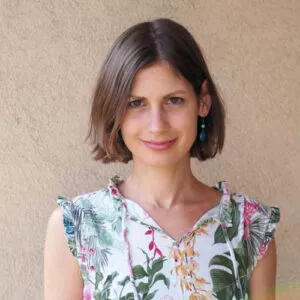
Eszter Draskóczy – ELKH supported research group, MTA-SZTE Antiquity and Renaissance: Sources and Reception Research Group, BTK Institute for Literary Studies
Title of her award application: “Underworld Trials and Hellish Punishments. Antique and Medieval Sources of Dante's Divine Comedy ”
Published this year, the researcher's monograph has not only become the latest required reading in research on Dante in Hungary, it has also revealed new findings in several aspects of international studies of Dante. This is particularly significant as the world will commemorate the 700th anniversary of Dante’s death this year. The work, which is outstanding from both a theoretical and methodological point of view, can also be used in secondary and higher education.

Zoltán Elekes – Centre for Economics and Regional Studies
Title of his award application: "Foreign-owned firms as agents of structural change in regions"
The primary author's study submitted in his application, is a unique presentation of the impact of the establishment of foreign-owned companies on the transformation of the local economic structure. Through the example of Hungary, it describes where and in what cases these companies create jobs in connection with economic activities that are new to a region. The study has already been incorporated into the literature on the subject and has been included in important and frequently cited writings.
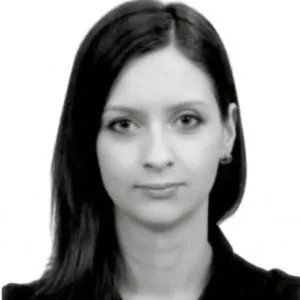
Szilvia Anett Nagy Hajnal – ELKH supported research group: MTA-PTE Clinical Neuroscience MR Research Group
Title of her award application: "Investigation of brain abnormalities in the field of stress and depression with modern imaging methods"
In a series of articles submitted in her application, the researcher and her colleagues demonstrated in studies on a model animal that acute and chronic stress affect not only cognitive performance, but also microstructural brain abnormalities detectable by modern imaging. The results can also be applied to patients with major depression and other psychiatric disorders, something which also demonstrates the practical significance of the research.

Tímea Haszpra – ELKH supported research group: MTA-ELTE Theoretical Physics Research Group
Title of her award application: “Using a snapshot attractor approach in multidimensional climate simulations to investigate the effects of climate change”
In a series of articles submitted in her application, the researcher developed a new method for the analysis of atmospheric long-distance relationships based on an internationally recognized approach. The results obtained with the method describe the characteristics of a long-distance connection and their modifications due to climate change, which means the method is expected to be widely applicable.
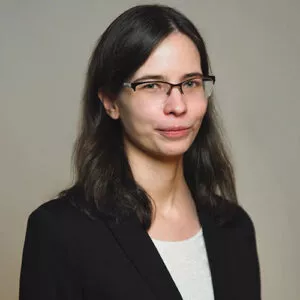
Ágnes Kalivoda – Research Centre for Linguistics
Title of her award application: "Productive connection patterns of verbs"
The researcher's award-winning study is a work of outstanding quality in terms of both its scientific significance and its modern technological background, which combines the professional curiosity of a linguist with the efficiency of today's technical possibilities. The value of the fieldwork is enhanced by the fact that the mapping of productive connection patterns of verbs based on vast textual material is a hitherto little researched area. The enumeration of the ways of forming verbs, including the identification of sound schemes, is in itself a commendable achievement.

Réka Könyves-Tóth – Research Centre for Astronomy and Earth Sciences
Title of her award application: "In the wake of the brightest starbursts – the secrets of the supernovae"
The series of articles submitted as her application and published in a prestigious international journal during 2020–2021 consists of three publications of which she is the primary author. One notable aspect of the publications is that Professor Craig Wheeler, one of the most acclaimed figures in the field, is also one of the authors. In her work, the researcher revealed several hitherto unknown correlations for the physical properties of starbursts.

Kitti Mezei – Centre for Social Sciences
Title of her award application: "Current challenges of cybercrime in criminal law."
In the niche-filling monograph submitted in her application, the researcher examines the extent to which the current regulatory environment is suitable for effective action against cybercrime in the domestic, EU and international contexts. The topic is extremely current and of outstanding scientific importance, as rapid technological development is bringing new challenges every day, something legal regulations and the application of the law must keep pace with.
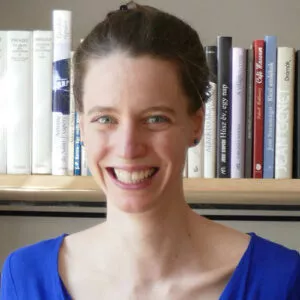
Eszter Nagy – Research Centre for the Humanities
Title of her award application: “A World Chronicle for Philip the Fair”
In this commendable study, the researcher explores a complex creative process through a multifaceted analysis of the World Chronicle and convincingly reconstructs the collaboration between the author and the craftsman who decorated the codex. She also successfully proves that the same Flemish miniator had previously worked for King Matthias. Her research illustrates the value of studying minor craftsmen to explore medieval artistic relationships.

Gergő Nemes – Alfréd Rényi Institute of Mathematics
Title of his award application: "Globally exact asymptotics for integrals with arbitrary order saddles”
In his dissertation, the researcher examines the long-term behavior of functions given by Laplace-type integrals, which are common in other fields of mathematics, physics, and science, using the tools of asymptotic analysis. He combines classical aspects of mathematics with modern techniques to answer the question raised in the paper. The results of the co-authored publication are well suited to the study of special functions, number theory, mathematical physics, and quantum mechanics.

Domonkos Pap – ELKH supported research group: MTA-SE Pediatric and Nephrological Research Group
Title of his award application: "Identification and use of new types of anti-inflammatory compounds"
This Junior Prima Award-winning research project is a European patent application identifying a new type of anti-inflammatory that the researcher helped to create. The patent application is based on the fact that, for the first time, a comprehensive anti-inflammatory and anti-scarring effect of an active ingredient has been demonstrated by extensive in vitro and in vivo experiments. Based on the results, the drug may be useful in the treatment of several currently unresolved therapeutic diseases, such as the reduction of severe inflammation and scarring in the lungs due to SARS-CoV-2 virus infection.

Beatrix Péter – Centre for Energy Research
Title of her award application: "Exploring the effects of epigallocatechin gallate on cell adhesion and cell motility and coatings by unlabeled techniques"
In her award-winning series of articles, the researcher examines the effect of green tea extract on the adhesion and movement of HeLa cancer cells, using groundbreaking techniques that can be considered pioneering. In her measurements, she found that the most significant antioxidant component of green tea reduces the movement and adhesion of cancer cells and that the drug adsorbs on the surfaces studied. The results of the research are also outstanding in an international context.

Zoltán Rádai – Centre for Ecological Research
Title of his award application: "Physiological and evolutionary background and costs of lifestyles with different rates of individual development"
The researcher's application project is a series of articles published in high-profile journals between 2017 and 2020, consisting of six publications of which he is the primary author. In these, he and his colleagues examined the triggers and effects of increased individual developmental rate on individual condition and reproductive success within the framework of lifestyle theory. The project demonstrates the researcher's systemic, precise mindset and scientific thoroughness.
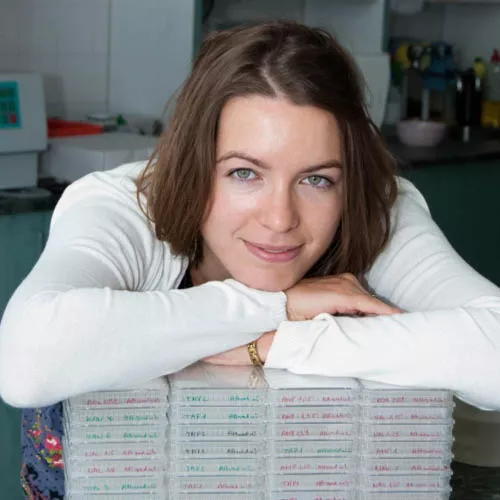
Réka Spohn – Biological Research Centre
Title of her award application: "Integrated evolutionary analysis reveals antimicrobial peptides with limited resistance”
In an article published as shared primary author in a prestigious international journal, the researcher examines the potential, likelihood, and consequences of developing resistance to antimicrobial peptides at the system level. Researchers have successfully identified antimicrobial peptides for which the development of resistance is limited. Recognizable results can serve as a starting point for the development of new therapies.
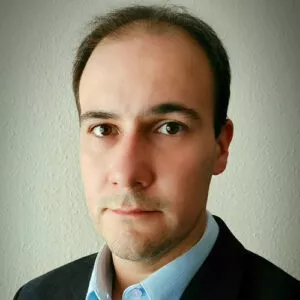
Gábor Szatmári – Centre for Agricultural Research
Title of his award application: "Modeling, evaluation and communication of spatial uncertainty with modern statistical approaches in digital soil mapping"
The researcher's application project is a series of articles published in prestigious international journals The research results presented in these, as well as the innovations in approach and methodology, are a significant contribution to the production of increasingly accurate and reliable digital soil maps. They also help understanding of the role of soils in relation to important societal goals, such as mitigating climate change and reducing landscape degradation.
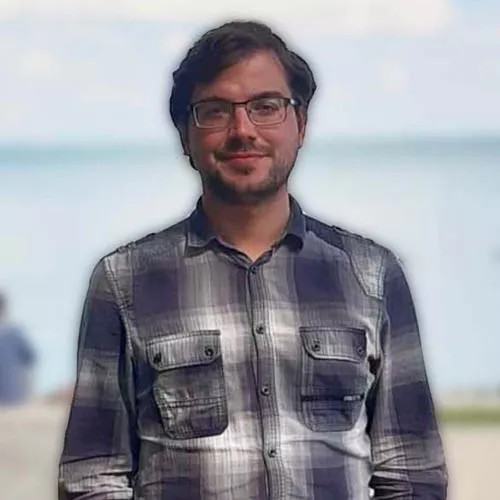
Gergő Thiering – Wigner Research Centre for Physics
Title of his award application: "Combined impact of Jahn-Teller effect and spin-orbit interaction on quantum bits in diamonds"
In his research, which was presented as his prize-winning project, the researcher systematically examined the magneto-optical properties of the elements in the four columns and the diamond point defect complexes formed by the vacancy. To this end, he developed a spin-Hamilton operator in which both electron-phonon and spin-orbit coupling are strong. Much attention was paid to the result of the Jahn-Teller effect, which successfully explained the behavior of the optically excited state of the neutral silicon vacancy.
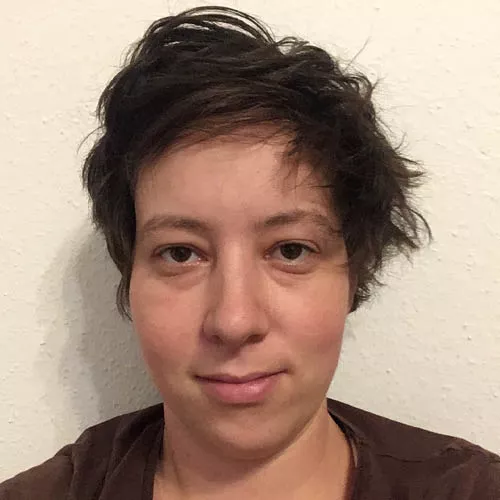
Anna Kis Varga – Research Centre for Natural Sciences
Title of her award application: "Use of non-invasive polysomnography to examine the socio-cognitive abilities of dogs"
The researcher's project is a series of articles published in prestigious journals between 2017 and 2020, including 15 publications that have elicited a significant response from the academic community. The research findings presented in these, which can be considered as a milestone in both theoretical and methodological terms, bring us closer to understanding the evolution of sleep, and also provide a new opportunity for veterinary diagnostics. Her experimental studies have established a new, independent subfield of cognitive behavioral science.
Research Professor Emeritus title
The purpose of establishing and presenting the title of Research Professor Emeritus is to recognize the successful research careers of researchers from the ELKH network, as well as their significant involvement in scientific organization.
In 2021 the title of Research Professor Emeritus was awarded to:
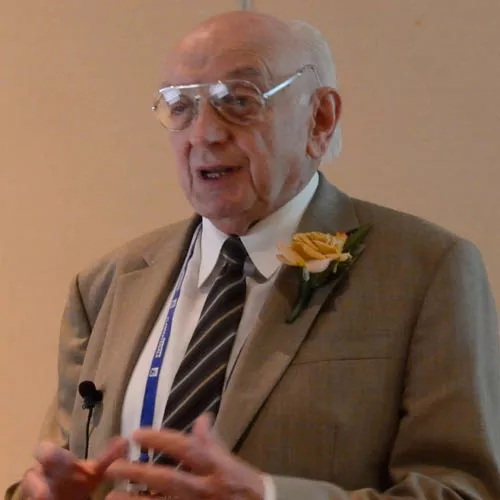
Péter B. Barna – Centre for Energy Research
As an expert on the growth mechanism of polycrystalline layers, Péter B. Barna has become a world-renowned and internationally recognized researcher. As long ago as the 1960s and 1970s, his experiments performed with in-situ microscopy in collaboration with Árpád Barna received a lot of attention. These experiments saw the recording of the growth and stratification of nanoparticles that evaporated under the microscope, and even at this time he already attached great importance to the effect of contaminants. Later, based on his findings in this regard, he proposed a new zone in the growth zone model, which was accepted and adopted in the academic literature.

Beáta Barnabás – Centre for Agricultural Research
Beáta Barnabás's research activities cover many areas of plant reproductive biology. She has achieved international recognition for her research on pollen. In the 1990s, she further developed her research into microspore-derived haploid induction, which laid the groundwork for the introduction of plant cell and tissue culture methods into plant breeding research.
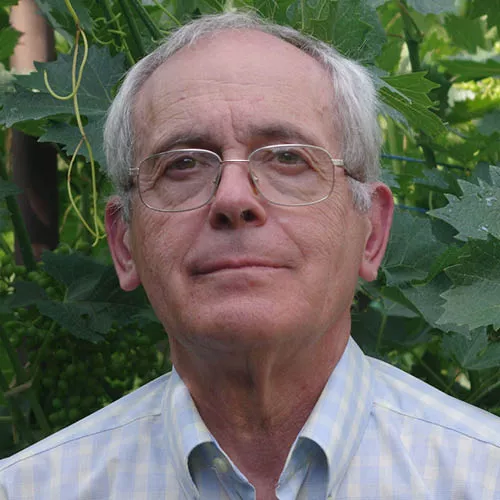
Gábor Besenyei – Research Centre for Natural Sciences
Gábor Besenyei is a notable expert in complex and organometallic chemistry and air-exclusion preparative techniques. His research work carried out in the Chemical Crystallography Research Laboratory of the Structure Research Center has been key to the group's small-molecule structure research. The construction and development of the chemical and crystallization laboratory is founded on his expertise, and his experience has been essential in both preparative and crystallization tasks.
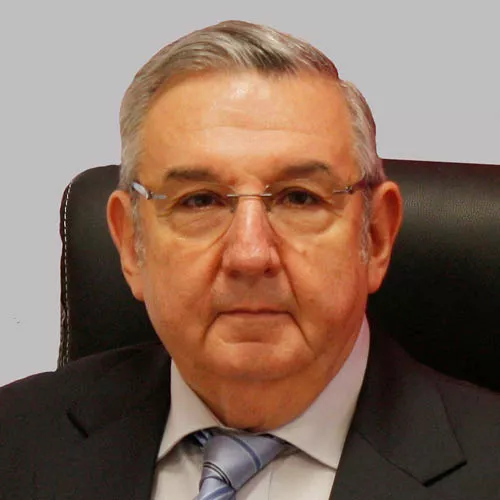
Aladár Czitrovszky – Wigner Research Centre for Physics
His research interests include laser measurement technology and nonlinear optics. His international research and development results have contributed to the considerable strengthening of laser physics and optics research at the institute. He has played a prominent role in the applied research projects implemented at the institute. He has been involved in the development of a number of new optical instruments and measurement procedures that have been used in toxicology, health and environmental protection, biology, and the chemical industry.
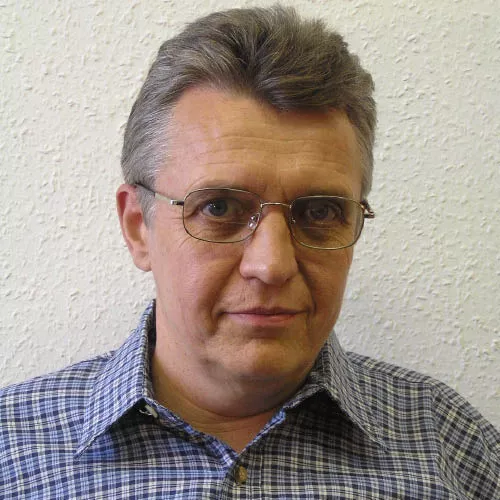
Péter Csathó – Centre for Agricultural Research
Péter Csathó specializes in plant nutrition, soil fertility and agri-environment. He considers the maintenance of field experiments to be a matter close to his heart, as well as of social usefulness in the preservation of Hungarian traditions and the nurturing of Hungary's professional heritage. His scientific achievements, new perspectives, unique system approach, and unique synthesizing ability have made him a widely known and recognized individual who has established a new school of thought.
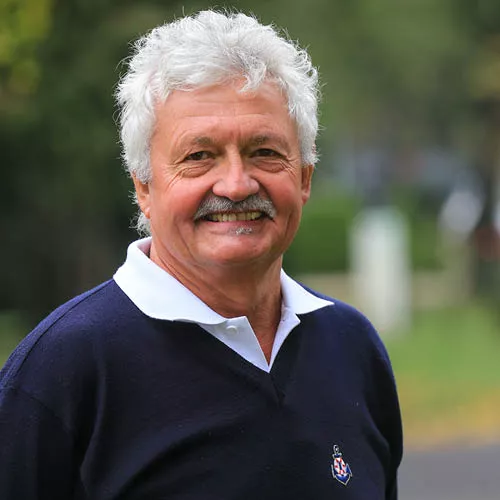
László G.-Tóth – Balaton Limnological Research Institute
László G.-Tóth's main areas of research are zooplankton population dynamics, nutritional biology, metabolism, and respiratory physiology and biochemistry. He has attracted the interest of the international limnological scientific community with dialysis bags used to test algae and bacteria. This was a significant innovation and an improvement on the hermetically sealed glass jars previously used for this purpose. In particular, he focuses on the protection of the environment and water quality.
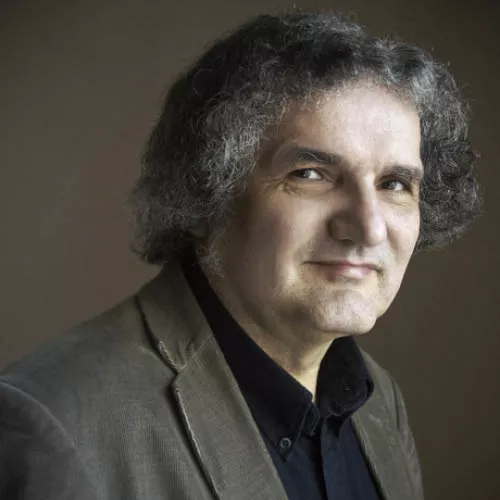
Gábor Gyáni – Research Centre for the Humanities
Gábor Gyáni is an essential figure in modern Hungarian social history research, while his historical and historiographical works are also highly significant. As a university lecturer, he has played an important role in educating the talent of the future. He has always encouraged the younger generation to raise new questions and launch research to meet gaps in our knowledge at both the institute and the university.

Pál Ormos – Biological Research Centre
Pál Ormos has worked in a number of research fields, achieving notable success in all of them. These include the structure-to-function relationship of proteins, the function of energy-converting proteins, optical micromanipulation, laser fabrication, the operation of microrobots, and microfluidics. He has been involved with several professional innovations, and the results of his research have been included in general physics textbooks.
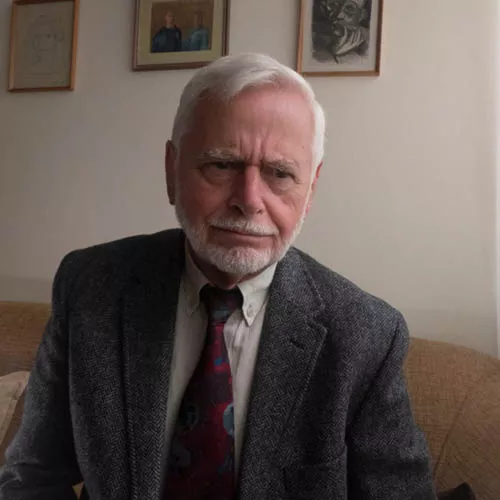
László Párkányi – Research Centre for Natural Sciences
He has been researching in the field of chemical crystallography for decades, and his findings have brought him international recognition. He has achieved particularly significant results in the structural exploration of organosilicon and organometallic compounds. His crystallographic measurements, and in particular computer programs to assist in their evaluation, are also highly valued internationally.
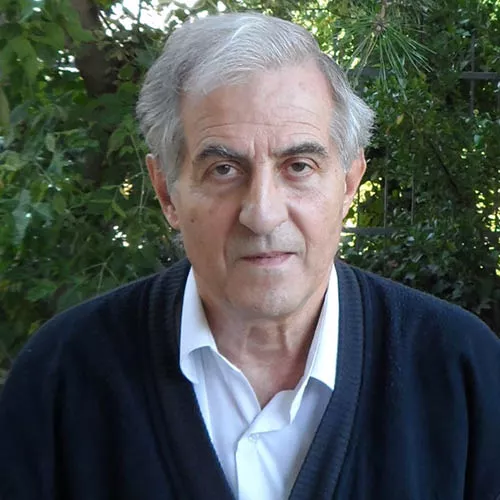
János Pintz – Alfréd Rényi Institute of Mathematics
János Pintz was involved in solving the twin prime conjecture, the greatest mathematical sensation of the last decade. The question appears to be very simple: Is there an infinitely number of pairs where both numbers are prime and the difference between them is two? Similar questions have been studied since antiquity, and Professor Pintz made a significant breakthrough in this field for which he received the Cole Prize of the American Mathematical Society in 2014.
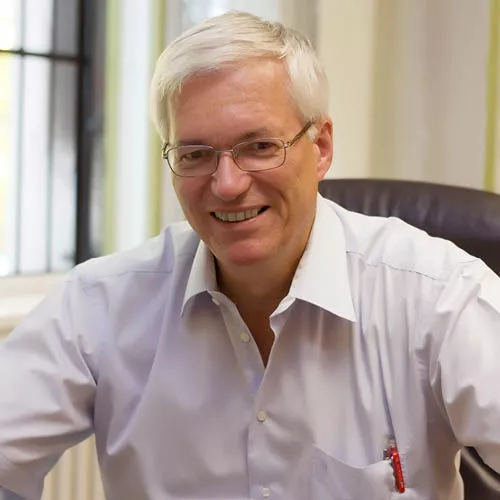
Béla Pukánszky – Research Centre for Natural Sciences
Béla Pukánszky achieved his most significant results in the study of interfacial interactions in heterogeneous polymer systems. He set up a model to describe the composition dependence of the yield stress of such materials. His research includes the study of the degradation of polyolefins, nanocomposites, and the study of biodegradable and medicinal polymers.
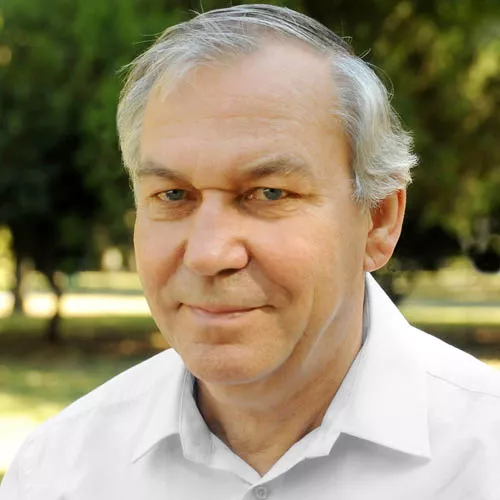
Kálmán Rajkai – Centre for Agricultural Research
Kálmán Rajkai is an internationally recognized researcher on one of today’s most pressing social problems, the soil moisture component of global water resources. He specializes in soil water management, soil physics and soil biophysics. He is the developer of measurement and estimation methods for soil water management. As part of his research, he has calculated the water use of plants and its spatial pattern from the measured soil moisture.

János Rechnitzer – Centre for Economics and Regional Studies
Though János Rechnitzer's narrower specialization is regional science, his work is characterized by an interdisciplinary approach. His research and books are the defining literature base for university and doctoral courses, as well as for regional and settlement development practice. He is the developer of the first regional innovation strategy in Hungary and is the manager of dozens of domestic development programs.
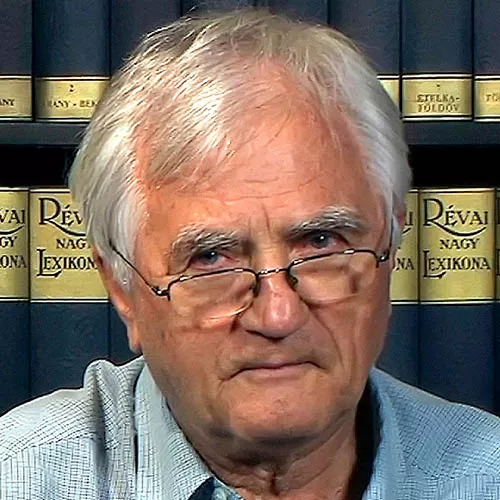
Márton Szabó – Centre for Social Sciences
Márton Szabó is the Hungarian creator and most significant representative of interpretive discursive political science. On the one hand, his work is typically rooted in Central or Eastern Europe. It shapes into a scientifically systematized theoretical view what the citizens of this part of Europe lived through en masse in the 20th century. On the other hand, it is open to the future, because focusing on the interpretive attitude allows the often unexpected new phenomena of socio-political reality to be interpreted and even managed from the applied point of view.
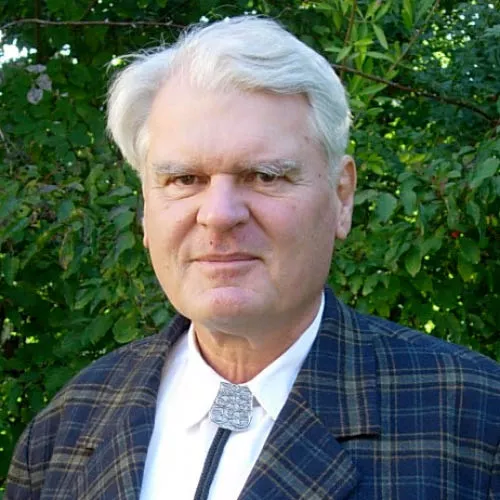
Miklós Tóth – Centre for Agricultural Research
As a young researcher, Miklós Tóth began researching the chemical ecology of insects and in a short time became one of the most important authorities in the field. In addition to basic research, he also deals with applied research, in which area his name is also associated with independent institutional innovation.
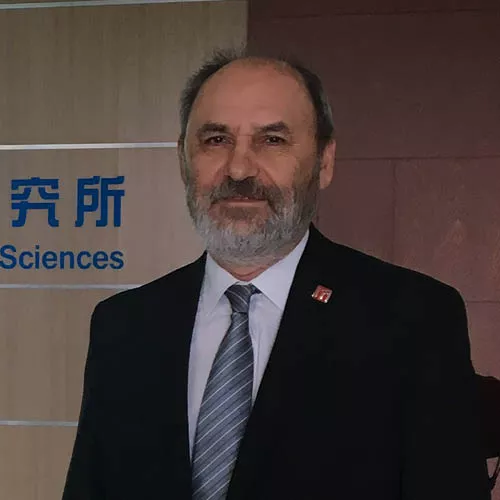
Tibor Tóth – Centre for Agricultural Research
Tibor Tóth specializes in the formation, mapping and ecology of saline soils, as well as the mechanisms of salt accumulation in soils and risk assessment methods for soil degradation processes. His new scientific achievements, his wide international recognition, as well as his teaching, scientific organizing and scientific public activities make him someone who has created his own school.
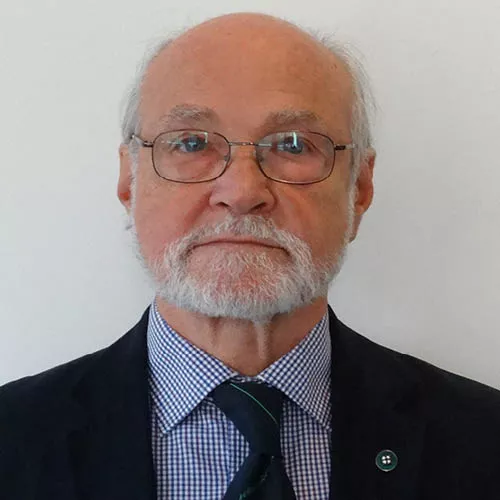
Imre Vörös – Centre for Social Sciences
Imre Vörös's work spans several distinct areas of law. At the beginning of his career, he dealt with civil law issues and later with significant works in the field of competition law, which also brought him recognition from the scientific community. It is worth mentioning that he also drafted and justified the first competition law in Hungary in the early 1980s. Subsequently, his scientific interest gradually turned to European Community law and European Union law. Through his scientific and organizational activities, he has played a major role in the domestication of research in this field in Hungary.
